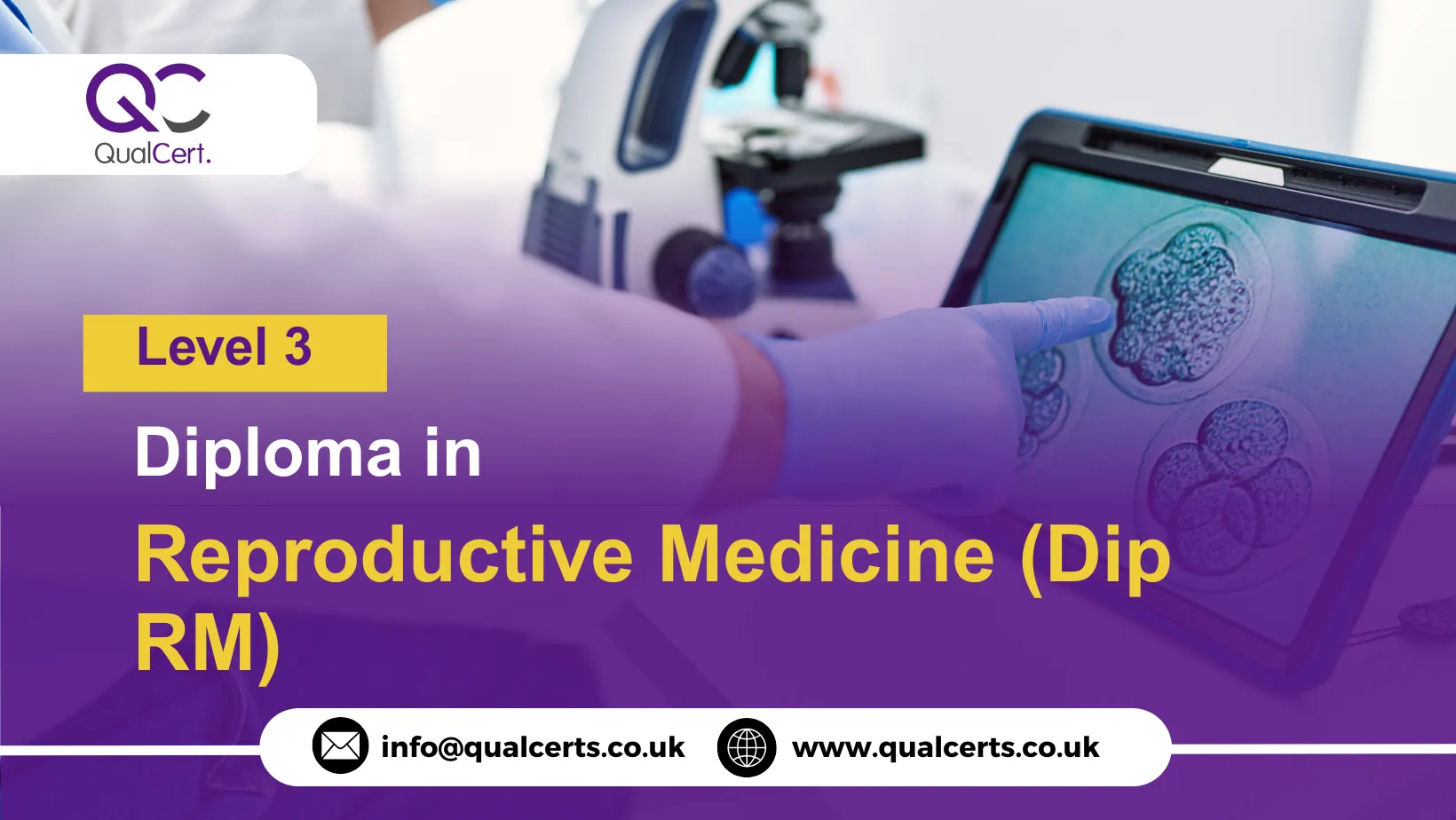The QualCert Level 3 Diploma in Reproductive Medicine (Dip RM) provides learners with a solid foundation in human reproductive health. The course covers reproductive physiology, fertility assessment, and the management of reproductive disorders in clinical practice.
Learners gain insight into assisted reproductive technologies (ART), clinical interventions, and treatment planning, with a focus on evidence-based practice. The programme also emphasises ethical, legal, and psychosocial considerations in reproductive medicine.
This diploma equips learners with the knowledge and practical understanding required to support patients, work effectively within healthcare teams, and contribute to reproductive health services. It is ideal for those seeking a professional pathway in fertility care and reproductive healthcare.
The QualCert Level 3 Diploma in Reproductive Medicine (Dip RM) equips learners with a robust foundation in reproductive health, fertility management, and patient-centred clinical practice. Combining theoretical knowledge with practical insights, this course prepares learners to work confidently in reproductive healthcare settings and pursue further studies or career advancement in the field.
Course Contents of QualCert Level 3 Diploma in Reproductive Medicine (Dip RM):
The QualCert Level 3 Diploma in Reproductive Medicine (Dip RM), offers 60 Credits, requiring a Total Qualification Time (TQT) of 300 hours, including 210 Guided Learning Hours (GLH).
| Unit Ref# | Unit Title | Credit | GLH | TQT |
| QC27137-1 | Advanced Principles of Reproductive Medicine and Physiology | 10 | 35 | 50 |
| QC27137-2 | Assessment, Diagnosis, and Clinical Decision-Making in Fertility Care | 10 | 35 | 50 |
| QC27137-3 | Management of Infertility and Assisted Reproductive Technologies | 10 | 35 | 50 |
| QC27137-4 | Reproductive Endocrinology, Pharmacology, and Treatment Planning | 10 | 35 | 50 |
| QC27137-5 | Ethical, Legal, and Psychosocial Aspects of Reproductive Medicine | 10 | 35 | 50 |
| QC27137-6 | Evidence-Based Practice and Professional Development in Reproductive Medicine | 10 | 35 | 50 |
Entry Requirements for the QQualCert Level 3 Diploma in Reproductive Medicine (Dip RM):
To enrol on the QualCert Level 3 Diploma in Reproductive Medicine (Dip RM), learners must meet the following entry requirements:
Minimum Age
Learners must be at least 16 years of age at the time of enrolment.
Educational Background
A minimum of a Level 2 qualification (or equivalent) is recommended. Learners without formal qualifications may be considered based on relevant experience or prior learning.
Experience
No prior experience in reproductive medicine is required, although an interest in healthcare, fertility, or patient care is encouraged.
Language Proficiency
Learners must demonstrate sufficient English language proficiency to fully engage with course materials, participate in assessments, and communicate effectively in practical or discussion-based activities.
Learning Outcomes for the QualCert Level 3 Diploma in Forensic Medicine (Dip FM):
Advanced Principles of Reproductive Medicine and Physiology
- Understand the biological and physiological processes involved in human reproduction.
- Explain reproductive system structure, function, and hormonal regulation.
- Recognise normal and abnormal reproductive health patterns.
- Appreciate the factors affecting fertility in both males and females.
Assessment, Diagnosis, and Clinical Decision-Making in Fertility Care
- Apply assessment techniques to evaluate reproductive health and fertility.
- Interpret diagnostic tests, laboratory results, and clinical findings.
- Make informed clinical decisions based on evidence and patient-centred care principles.
- Recognise the role of multidisciplinary collaboration in fertility assessment.
Management of Infertility and Assisted Reproductive Technologies
- Understand common causes of infertility and their clinical implications.
- Explore assisted reproductive technologies (ART) including IVF and IUI.
- Apply strategies for treatment planning and patient support.
- Evaluate interventions to optimise reproductive outcomes and patient wellbeing.
Reproductive Endocrinology, Pharmacology, and Treatment Planning
- Understand the hormonal and endocrine mechanisms that influence reproduction.
- Recognise pharmacological interventions used in fertility treatment.
- Develop treatment plans based on patient needs, safety, and evidence-based guidelines.
- Appreciate the importance of monitoring and follow-up in reproductive care.
Ethical, Legal, and Psychosocial Aspects of Reproductive Medicine
- Understand ethical principles and legal frameworks in reproductive healthcare.
- Recognise psychosocial factors affecting patients undergoing fertility treatment.
- Apply patient-centred approaches to counselling and informed consent.
- Demonstrate professional responsibility and confidentiality in reproductive medicine.
Evidence-Based Practice and Professional Development in Reproductive Medicine
- Apply evidence-based practice in clinical decision-making and patient care.
- Critically evaluate research and clinical guidelines in reproductive medicine.
- Demonstrate reflective practice and continuous professional development.
- Recognise the importance of multidisciplinary teamwork and communication in fertility care.
Aspiring Healthcare Professionals
Individuals seeking foundational knowledge in reproductive medicine to support a career in healthcare, nursing, or allied health professions.
Fertility and Clinical Support Staff
Healthcare assistants or support workers working in fertility clinics, hospitals, or reproductive health services.
Students Preparing for Higher Education
Learners aiming to progress to higher-level qualifications in medicine, nursing, biomedical sciences, or reproductive health.
Personal and Professional Development
Individuals interested in enhancing their expertise in reproductive health, fertility care, and patient-centred clinical practice.
The Centre Requirements for QualCert Level 3 Diploma in Reproductive Medicine (Dip RM):
Qualified Tutors
- Tutors must hold relevant academic qualifications (Level 4 or higher) in medicine, nursing, reproductive health, or a related healthcare discipline.
- Tutors should have practical experience in reproductive medicine and experience in teaching or supervising learners.
Learning Resources
- Centres must provide access to textbooks, journals, digital resources, case studies, and current research relevant to reproductive medicine.
- Learners should have opportunities to apply evidence-based guidelines and best practices.
Facilities and Support
- Centres must provide suitable facilities for guided learning, workshops, and practical assessments.
- Online delivery should be supported by a secure, interactive platform with reliable learner access.
Assessment Standards
- Centres must adhere to QualCert’s quality assurance procedures.
- Assessments should be fair, transparent, and aligned with qualification requirements.
Student Support
- Academic guidance should be provided for coursework, practical assessments, and progression pathways.
- Pastoral support should be available to ensure learner engagement and wellbeing.
- Learners should receive advice on further education and career progression opportunities in reproductive medicine.

